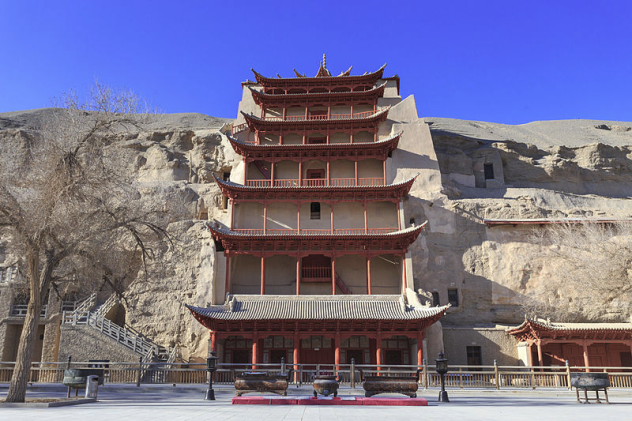 History
History  History
History  Weird Stuff
Weird Stuff 10 Wacky Conspiracy Theories You Will Need to Sit Down For
 Movies and TV
Movies and TV 10 Weird Ways That TV Shows Were Censored
 Our World
Our World 10 Places with Geological Features That Shouldn’t Exist
 Crime
Crime 10 Dark Details of the “Bodies in the Barrels” Murders
 Animals
Animals The Animal Kingdom’s 10 Greatest Dance Moves
 Movies and TV
Movies and TV 10 Box Office Bombs That We Should Have Predicted in 2025
 History
History 10 Extreme Laws That Tried to Engineer Society
 History
History 10 “Modern” Problems with Surprising Historical Analogs
 Health
Health 10 Everyday Activities That Secretly Alter Consciousness
 History
History 10 Dirty Government Secrets Revealed by Declassified Files
 Weird Stuff
Weird Stuff 10 Wacky Conspiracy Theories You Will Need to Sit Down For
 Movies and TV
Movies and TV 10 Weird Ways That TV Shows Were Censored
Who's Behind Listverse?

Jamie Frater
Head Editor
Jamie founded Listverse due to an insatiable desire to share fascinating, obscure, and bizarre facts. He has been a guest speaker on numerous national radio and television stations and is a five time published author.
More About Us Our World
Our World 10 Places with Geological Features That Shouldn’t Exist
 Crime
Crime 10 Dark Details of the “Bodies in the Barrels” Murders
 Animals
Animals The Animal Kingdom’s 10 Greatest Dance Moves
 Movies and TV
Movies and TV 10 Box Office Bombs That We Should Have Predicted in 2025
 History
History 10 Extreme Laws That Tried to Engineer Society
 History
History 10 “Modern” Problems with Surprising Historical Analogs
 Health
Health 10 Everyday Activities That Secretly Alter Consciousness
10 Stories Of China’s Human Flesh Search Engines
Despite the best efforts of China’s Internet censors and government to stifle and control dissent, the Internet has proved to be the means through which thousands of individuals can coordinate online lynch mobs that have targeted corrupt party officials, social deviants, or innocent people. These are called renrou sousuo, or human flesh search engines. Here are 10 stories of what they can achieve, for better or worse.
10 Kitten Killers

Warning: The images in the source links are graphic and may be disturbing.
In 2006, a video of a well-dressed woman crushing kittens with stiletto shoes caused massive controversy and an online crusade to identify the culprit. The images were traced to a video uploaded by user “Gainmas” for a company known as Crushworld, a fetish website specializing in videos of small animals crushed to death by attractive women. These videos are sold on disc for 15 yuan a pop (just under $2 US at the time). The woman’s QQ account profile was discovered; she had posted “I crush everything between you and me.”
Within six days, she was identified as a 38-year-old nurse from Hubei province, who claimed that depression and aimlessness following her failed marriage made her susceptible to being talked into crushing animals on camera. The website was shut down by a massive denial of service attack, and both the woman and the cameraman, who worked for a provincial television station, gave public apologies and lost their jobs over the backlash.
Another vicious attack on a feline aroused Internet fury in 2009. A Hebei University student was accused in the Mop BBS post “Deviant Boy Brutally Kills Garfield” of killing a beloved campus stray with an explosive device. Online activists soon identified a suspect through Internet sleuthing and posters around the campus.
9 Ostentatious Spenders

Growing wealth inequality in China has led to some individuals showing off their wealth online, along with a corresponding desire by the less fortunate to punish such acts of vanity. In 2011, a forum user named “Jackie_Zheng Wen” posted images of a lavish meal worth 83,000 yuan ($13,172 US). The 30-course meal included six endangered giant salamanders, mooncakes filled with shark’s fin and spirulina algae, 15-year-old premier Moutai distilled liquor, and expensive cigarettes. A furious human flesh search soon determined that a person of the same name was a 1982 graduate of the Beijing-based Chinese Communist Party school for young leaders, leading to comments such as “Since you’re so rich, why don’t you donate to poor kids in remote villages?” and “Does this have anything to do with the Party school, young comrade?” In response, the user denied attending the school and swiftly deleted everything.
Another person who suffered for her vanity was Guo Meimei, a woman in her twenties who posted photographs of her extravagant lifestyle of villas, luxury cars, and designer handbags on the social networking site Sina Weibo, all while claiming to work as a general manager for the Red Cross Society. After the backlash, both Guo and the Red Cross Society denied a connection with each other, but support for the charity collapsed in the scandal. Guo was arrested in 2014 on charges of gambling and prostitution, appearing on state television dressed in orange prison attire, tearfully apologizing for showing off and soiling the charity’s reputation. Online critics suspected the sudden state media exposure of the Red Cross scandal was actually a ploy to distract the public from government corruption, bungled disaster relief, and ethnic unrest in Xinjiang.
8 Regimental Commander’s Wife At Mogao Caves

When a young attendant at the historic Mogao caves in Gansu province told a middle-aged woman to stop touching an ancient Western Xia Dynasty cave painting, she was attacked and slapped by the woman’s two hulking bodyguards. Security guards stopped the woman and her goons, who then accused the 19-year-old attendant of attacking them. The woman turned out to be the wife of a military regimental commander, who told the guards: “Don’t waste police [time], isn’t this just a tourist attraction? Isn’t she just a little [attendant]? We are people with status. A small thing only takes couple of minutes, do not make it a big deal.”
The woman remained arrogant and imperious even when the police arrived. She eventually deigned to give a half-hearted apology to the attendant, before leaving with a smile on her face. The license plates of two luxury cars in her convoy were photographed outside Dunhuang Hotel and uploaded for the hungry hordes of the human flesh search engine. That soon wiped the smile off her face, as public outrage over the assault and the couple’s use of government vehicles for leisure reached the attention of military corps leaders. Within a few days, the Xinjiang Production and Construction Corps announced that both the commander and his wife had lost their positions over bad behavior and illegal use of official vehicles. So much for status.
7 The Framing of Uncle Ou

Guangzhou-based activist and muckraker Ou Shaokun is famous for uploading photos of license plates onto social media to expose the personal use of official vehicles by corrupt officials. He lurks outside entertainment districts, expensive restaurants, and hotels looking for government cars. After uploading several such photos of Guangzhou government cars being driven in Hunan province, Ou was taken to dinner and karaoke by a supporter and a man named Chen Jialuo. Later that evening, a woman from the karaoke parlor entered Ou’s hotel room, undressed, and began to kiss him, only for the police to suddenly launch a raid and arrest Ou for soliciting a prostitute. Ou was forced to give a televised confession.
Ou’s supporters smelled a rat and fired up the human flesh search engine, finding some evidence that the man named Chen Jialuo was actually Captain Chen Jianluo of the Changsha Domestic Security Department. Government censors acted quickly to suppress the information, blocking searches for Chen Jianluo’s name, and allegedly issued the following leaked instructions: “All websites immediately cool down focus on ‘Uncle’ Ou Shaokun’s visit with a prostitute. Do not make it a lead story. Control commentary, and block searches for important related information.” It got out anyway, and Ou soon declared his confession had been taken out of context and that he planned to sue the police department for wrongful arrest.
6 Government Official Attacks An 11-Year-Old Girl
In Shenzhen’s Plum Garden Seafood Restaurant in 2008, a large, older man approached an 11-year-old girl and asked for directions to the washroom. He asked her to lead him there, after which he grabbed her by the neck and tried to push her into the men’s bathroom. She managed to escape back to her family, but when her furious father confronted the man, he said, “I did it, so what? How much money do you want, give me a price. I will pay it!” He also said, “Do you know who I am? I was sent here by the Beijing Ministry of Transportation, my level is the same as your mayor. So what if I pinched a little child’s neck? Who the f— are you people to me?”
The police arrived and wrote the incident off by saying the man was drunk and that there was no evidence of a sexual assault. But after a video of the incident was posted online, Internet users identified the drunk lecher as Lin Jiaxiang, a party secretary of Shenzhen Maritime Administration. The Internet firestorm led to Lin’s dismissal from his position, officially because his “wild words and behaviour have had an extremely negative impact on society.” However, he was cleared of child molestation charges, with police investigators instead preferring to call it “drunken misbehavior.” The outrage over the incident was best described by a Netease commenter: “You use public funds to eat and drink, we endure it; you show off your public cars, we endure it; you have third and fourth ‘wives’, we endure it; you have many villas/houses, we endure it. Now you will not even leave our own children alone.”
5 Yang Dacai’s Smile

Photos of Yang Dacai, chief of the Shaanxi Administration of Work Safety, smiling at the scene of a major traffic accident caused an online uproar in 2012. Users were incensed at his seemingly casual attitude in the wake of 36 fatalities after a bus rammed into the back of a methanol tanker truck. The photos of Yang, smiling and rotund in front of the burnt-out skeleton of the truck, were uploaded by user “author god bless” to Weibo and turned netizens against the hapless official.
Human flesh search engine efforts soon uncovered photos of Yang wearing expensive watches that seemed beyond the means of an ordinary government official, unless he was taking bribes. This made him the subject of mocking online memes and earned him the nickname “Brother Wristwatch,” as well as rendadaibio, a play on words that sounds like the term for a People’s Congress representative but actually means “Big Men Wear Watches.” Despite claiming that he was only trying to cheer up the rescue crew, the result of the online fracas was a corruption investigation that saw him jailed for 14 years on bribery charges. Suspiciously, or maybe fittingly, he smiled as his sentence was being read out.
4 Brother Sharp

A homeless man living in Ningbo became the sudden target of a human flesh search of a more positive kind when netizens praised his handsome looks and keen sense of style. “Those sad eyes/that sad expression, the sad mustache, the miraculous godly hair, and that messy hair, all of it has deeply captivated me.” He became known as Brother Sharp, Beggar Prince, or Handsome Vagabond and became the center of an online sensation. (Note that the picture above is a stock photo and not Brother Sharp; photos are in the source links.) Thousands of comments praised his looks, he was incorporated into memes, and interest in a “homeless chic” style emerged.
As more information became available, it turned out Brother Sharp was partial to dressing in women’s clothing, which might have enhanced his appeal, but it also turned out that he may have psychological problems, described by one blogger as “great fog sickness.” Bloggers reported that he would eat food from the ground, talk to himself, and burst into tears when approached by online fans trying to help him. Due to the explosion of fame, he was eventually reunited with his family. The involvement of the human flesh search engines led one local social worker to say that “Homeless people are vulnerable. It is incorrect to use them for entertainment purposes.”
3 Li Gang Incident

Two female university students who were inline skating through the grounds of Hebei University were struck by a speeding Volkswagen sedan in 2010, leaving one with a broken leg and killing the other. The drunk driver was Li Qiming, the son of then deputy police chief Li Gang; he was driving his girlfriend to school. Li Qiming drove away as if nothing had happened, but when stopped by students and campus security, he shouted, “Go ahead, sue me if you dare, my father is Li Gang!” As soon as the reports reached the Internet, the human flesh search engine launched a full assault on Li, uncovering all his personal and family information, flooding his social media accounts with hostile comments, and turning the expression “My dad is Li Gang” into a meme that was mixed with classical poetry and proverbs to indicate invincibility and the denial of responsibility for one’s actions:
“The luminous moonshine before my bed,
Is thought to be the frost fallen on the ground.
I lift my head to yell at the security gard,
My father is Li Gang.”
Government attempts to stifle reports of the event failed, and with the online campaign raging, Li and his father were forced to make public apologies. The police eventually arrested Li Qiming for manslaughter. Despite his father’s status, he was sentenced to six years in prison and ordered to pay compensation to the surviving victim and the family of the victim who died.
2 Sichuan Earthquake Reaction And Counterreaction
A 21-year-old woman named Gao Qianhui, angered at the three-day moratorium placed on online games in the wake of the 2008 Sichuan earthquakes, vented her anger in an online rant: “I turn on the TV and what do I see? Dead bodies, injured people, corpses, rotten bodies, all the crazy acts you guys are putting up. It’s not that I want to watch these things. I have no choice. [ . . . ]Sigh . . . all you guys . . . if you’re hit by the rubble just go suffer by yourself quietly[ . . . ]Come on, how many of you guys are dead? Just a few, is it not? We’ve got so many people in China anyway.” The reaction from online activists was swift, with thousands of negative comments from users. The firestorm of vitriol even led to her arrest.
A similar but more troubling case involved a user named “Diebao” on the forums of popular culture website Douban, who posted that the government was exploiting the earthquake to incite nationalist sentiment. Pro-government netizens took offense and dug through her posting history for incriminating evidence. They found what they were looking for in the form of a post made shortly after the quake struck, when she was possibly in shock: “I felt really excited when the earthquake hit. I know this experience might happen once in a lifetime. When I watched the news at my aunt’s place, I found out that it caused five people to die. I feel so good, but that’s not enough. I think more people should die.” Her words were reposted under the title “She Said the Quake Was Not Strong Enough.” This immediately sparked a mass effort to attack the woman, including aggressive messages sent to her school. She was expelled from her university, “for her own protection.”
1 Poisoning Of Zhu Ling

In 1996, Zhu Ling, a sophomore at Beijing’s prestigious Tsinghua University, was poisoned, causing stomach pain, hair loss, and eventual paralysis. A friend of Zhu’s at Peking University, one of the few places in China with online access at the time, turned to Usenet for help in diagnosing her symptoms with a post entitled “SOS.” About 1,500 doctors from around the world weighed in, with the consensus developing that she was suffering thallotoxicosis, caused by exposure to thallium. She was saved through an antidote, the dye Prussian Blue, but was left disabled, partially blind, and with the mental capacity of a six-year-old. No police investigation into the poisoning was carried out, despite suspicions directed at her roommate, Sun Wei.
A decade later, a user named “skyoneline” posted on the Tianya message board questioning Sun Wei’s innocence and accusing her of using family connections to cover up a crime. Sun Wei herself posted to defend her innocence but, weirdly, also criticized the University’s lax security policies by saying her brother had been able to penetrate into the area where the thallium was stored. By then, she had relocated to the United States and changed her name to Jasmine Sun. The controversy slipped back into obscurity.
The Zhu Ling case was highlighted again in 2013 by the poisoning death of Fudan University student Huang Yang by his roommate, which coincided with the Boston Bombing in the US. The open handling of student deaths and injuries by the American media and police touched a nerve with Chinese netizens used to government censorship, and the result was a new call to arms to get to the bottom of the Zhu Ling case. The grassroots campaign, which called for the reopening of the case and the return of Sun to China, was immediately the subject of censorship and deletions by the government.
The human flesh search engine then turned to the Obama administration’s We the People online petition system, with thousands of Chinese petitioning for the deportation of Jasmine Sun. It came to nothing, but eventually Chinese state media broke its silence on the case, if only to stem rumors about a conspiracy. Right-wing newspaper Global Times backhandedly dismissed the rumors with the editorial, “Sun’s family background was not distinguished enough to prevent security organs from investigating the situation at a top university in China.” The truth may never be known, but a user claiming to be Sun Wei posted two lines in response to the controversy: “For all these years, I have been waiting for truth to emerge like many others. It’s up to other people to laugh at or attack me.”
David Tormsen is a Beggar Prince and doesn’t wear a wristwatch.








